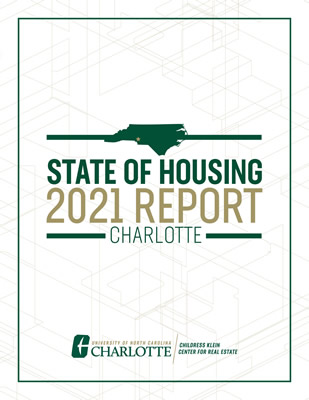
As the pandemic rages on, so does the acceleration of increasing housing prices in the Charlotte region.
Home buyers throughout the eight-county Charlotte region are facing towering prices and a lack of affordable housing, according to the “2021 State of Housing in Charlotte Report,” which was released by UNC Charlotte’s Childress Klein Center for Real Estate (CKCRE) on Wednesday, Nov. 17.
According to the report, median home prices in the Charlotte market increased at an annual rate of 16.3% from September 2020 to September 2021. The report also found a dramatic increase in rental prices. In 2021, the average effective rent in the region increased by $198 or 16.6% per unit.
The region was already attracting newcomers prior to the pandemic. However, the pandemic has further accelerated the growth, said Yongqiang Chu, CKCRE director and the primary author of the housing report.
“A persistent and strong demand for housing combined with the struggles from the supply side during the pandemic caused an unprecedented increase in house prices,” Chu said. “The region is also experiencing a rapid shift in the distribution of house prices. Should the trend continue, the Charlotte region may soon face significant challenges regarding housing affordability.”
Key takeaways from the report:
- The supply of owner-occupied housing is extremely tight. Of all the houses sold in January 2020, about 16% of them sold above the listing prices. Compare that to June and July 2021, when the percentage reached a historic high of 59%
- Affordable houses are becoming extremely difficult to find. Only 4.4% of the houses sold were under $150,000, and only about 35% of the houses sold were under $300,000
- Middle-income housing affordability is becoming a significant challenge for the region. While the situation is alleviated by the low interest rate, the problem will become more severe when monetary policy tightens post-pandemic
- The pandemic has affected African Americans and Hispanics disproportionately. At the end of September, nearly 10% of African American households statewide were behind on mortgage payments. African American and Hispanic renters also faced much higher eviction rates during the pandemic
CKCRE’s 2021 research report also includes an in-depth review of housing in the Charlotte region over the last 20 years.
The main findings from the long-term analysis are:
- House price growth rates are accelerating. The average annual growth rate of median houses was 4.98% from 2010 to 2015, and 7.8% from 2015 to 2020
- House price growth rates are much higher at the lower end than at the higher end in recent years. The 25th percentile of house prices increased at an annual rate of 8.37% from 2010-20, while the 75th percentile increased at a 4.31% annual rate
The report, which pulls from seven primary data sources, focuses on Mecklenburg County and the seven counties that surround it: Cabarrus, Gaston, Iredell, Lincoln, and Union counties, as well as Lancaster and York counties in South Carolina.
The report was released at the virtual 2021 State of Housing in Charlotte Summit. The summit, which opened with a welcome from UNC Charlotte Chancellor Sharon L. Gaber, also included an industry panel discussion that focused on affordable housing.
Since it was first released in 2019, the annual report has become a go-to resource for reporters and governmental officials looking for accurate data on the state of housing in the region. The report is part of a multi-year project, led by Belk College of Business faculty, that aims to serve as a critical piece of research and starting point for discussion regarding housing policy in the Charlotte region.
CKCRE’s State of Housing in Charlotte is supported by these industry partners:
- Canopy Realtor Association
- Crosland Southeast
- Evergreen Strategies
- INLIVIAN
- Piedmont Public Policy Institute
- True Homes Inc.